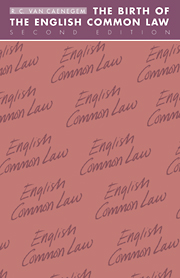1 - English courts from the Conqueror to Glanvill
Published online by Cambridge University Press: 05 June 2012
Summary
‘Ne inde clamorem audiam pro penuria recti’
It was with considerable trepidation that I undertook, as a continental scholar, to lecture on English legal history in an English university, and particularly in Cambridge, where Maitland once used to teach. Fortunately, I can plead extenuating circumstances for this temerity, to which the Faculty in inviting me agreed, showing a commendable lack of prejudice. I have had the good fortune to study in this country for a considerable time and to become familiar with its history, notably by working on unpublished material in depositories large and small, up and down the country; above all I have had the rare privilege of working on the early history of the Common Law under the supervision of the late Professor T. F. T. Plucknett, a very learned and patient master, who felt that a continental approach to English history might throw some new light on such questions as the possible Roman origin of certain Common Law notions and procedures. Also, England is near to my own country and their historical ties very close: the Flemish knights and their retainers who joined William of Normandy (married to the daughter of their own count) in the conquest of England were numerous. Though this sort of military adventure is now out of fashion, the intellectual adventure of conquering some difficult problem of another country's history is equally thrilling.
One reason why my subject may be considered difficult, is the state of the evidence, The contrast between the period from the Conquest to Glanvill, with which I shall deal here, and the following centuries is striking.
- Type
- Chapter
- Information
- The Birth of the English Common Law , pp. 1 - 28Publisher: Cambridge University PressPrint publication year: 1988



